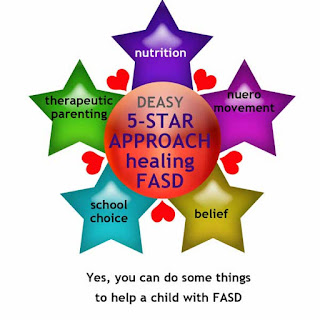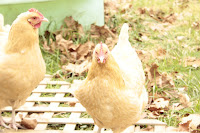What is Fetal Alcohol Spectrum Disorder?
It's pretty simple really. According to Birth Defects.org
"Fetal Alcohol Syndrome is a group of physical, mental, and neurobehavioral birth defects that result from the mother drinking alcohol during her pregnancy.
Children with FAS may have many but not all of the following characteristics:
Growth deficiencies: low birth weight and length with ongoing growth deficiency and/or failure to thrive
Facial abnormalities: small eye openings, eye problems, ear deformities, flat mid-face, short upturned nose, low nasal bridge, and smooth, thin upper lip
Organ abnormalities: heart and liver defects
Skeletal deformities: small head, deformed ribs, curved spine, and joint problems
Central nervous system damage: mental retardation, tremors, seizures, coordination problems, learning disabilities, and abnormal behavior such as extreme nervousness, poor socialization skills, attention deficit, and hyperactivity
The facial characteristics of FAS may be most apparent in a child who is between the ages of two and ten. Prenatal alcohol exposure does not always result in FAS. Some babies are born with Fetal Alcohol Effects (FAE) that may include some but not all of the symptoms of FAS. These babies may be normal physically and mentally but have other symptoms such as hyperactivity and behavior problems."
How do you know if your child has Fetal Alcohol Syndrome?
While some deformities of FAS may be evident through prenatal ultrasound, it is difficult to diagnose FAS during pregnancy. Severe cases of FAS can be diagnosed at birth. The diagnosis is not based on a single symptom, and mild cases may be difficult to diagnose.
Some FAS cases may be similar to other conditions that have some of the same characteristics, which can make diagnosis very difficult.
Infants with FAS often are irritable, overly sensitive to noise, behind in their development, have trouble eating and sleeping, have too little or too much muscle tone, and don’t like to be held. If a child exhibits these symptoms or the other problems mentioned above and the mother drank alcohol during her pregnancy, a trained medical professional can evaluate the child for FAS.
Doctors typically rely on these symptoms and evaluations of intelligence and language development to help make a diagnosis. When a child is diagnosed, other children of the mother should be evaluated to determine whether they also have FAS.
What causes Fetal Alcohol Syndrome?
FAS is caused by the mother drinking alcohol during her pregnancy. The alcohol passes from the mother’s bloodstream through the placenta into the blood supply of the developing baby. Alcohol in the baby’s system can kill developing brain cells, slow growth of the brain, interfere with the neural connections in the brain, and affect other organs. Often mothers who drink have poor eating habits that also affect the baby. The range and severity of damage from alcohol varies from case to case and may be the result of various factors such as the quantity of alcohol consumed, the timing during pregnancy, the pattern of alcohol use, genetics, and environmental factors. There is no known safe level of alcohol consumption during pregnancy. FAS is 100% preventable when a woman abstains completely from alcohol consumption during her pregnancy.
How can you help a child with Fetal Alcohol Syndrome?
There is no cure for FAS. Major physical defects of FAS may be corrected by surgery. Early diagnosis is important so intervention programs can be started such as speech therapy, physical therapy, and special assistance in school.
Counseling and treatment programs can also help women struggling with alcohol abuse. Understanding FAS and having the support of professionals and other parents of children with FAS can help families cope with and manage the symptoms of FAS. Some steps parents can take to help manage behavior problems of FAS include implementing daily routines, creating and enforcing simple rules, using rewards for proper behavior, and encouraging decision-making in safe environments.
What’s in the future for a child with Fetal Alcohol Syndrome?
 Many of the physical characteristics of FAS become less noticeable as the child ages. The emotional and behavioral problems, however, may increase. The symptoms of the neurological damage are usually the most serious.
Many of the physical characteristics of FAS become less noticeable as the child ages. The emotional and behavioral problems, however, may increase. The symptoms of the neurological damage are usually the most serious.Most children will have normal intelligence while others will have mental retardation. Many children have serious problems with attention, impulse control, behavior, judgment, problem-solving, abstract concepts, and memory. Some children have vision and hearing difficulties.
As children with FAS mature, they may have difficulty performing in school, keeping jobs, and maintaining healthy relationships. Therefore, early diagnosis and treatment are important to help maximize a child’s potential.
Birth Defects.Org has a good fact sheet describing fasd. They also have a downloadable pdf that you can refer to for more detailed information. That is where I got a lot of my information.
The number of children born in the US with fasd is proven to be increasing.
I feel that this is the place to once again point out that FASD is completely preventable.
The next 5 links have a wide range of depth of information on prevention of FASD:
I did not put together this page to discourage anyone. I am the type of person that likes to have facts as a foundation for decisions made towards a better end so just in case you are that way too here are facts for you to use as a base to help you make your decisions upon. I also wanted this in black & white for all of the "He looks normal & healthy." people who have a hard time seeing the severity of my son's disability. For all of the people who do not realize the work and intensity of the training that has gone into this child to help him fit into your world as much as he is able to fit into it. The next step is hope & hard work. I will tell you more about that in the next post.
Peace,
Fred's Mom










